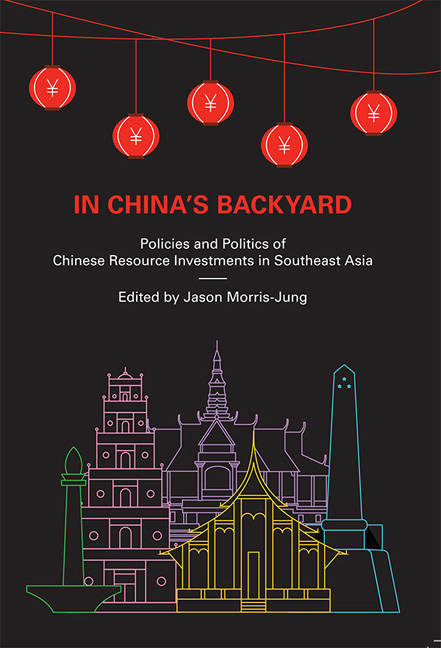Book contents
- Frontmatter
- Contents
- Foreword
- Acknowledgements
- About the Contributors
- 1 Introduction
- 2 Mixed Motivations, Mixed Blessings: Strategies and Motivations for Chinese Energy and Mineral Investments in Southeast Asia
- 3 Mineral Resources in China's “Periphery” Diplomacy
- 4 Energy Entanglement: New Directions for the China–Indonesia Coal Relationship
- 5 Indonesia–China Energy and Mineral Ties: The Rise and Fall of Resource Nationalism?
- 6 The Direction, Patterns, and Practices of Chinese Investments in Philippine Mining
- 7 Development Cooperation with Chinese Characteristics: Opium Replacement and Chinese Rubber Investments in Northern Laos
- 8 The High Cost of Effective Sovereignty: Chinese Resource Access in Cambodia
- 9 Complex Contestation of Chinese Energy and Resource Investments in Myanmar
- 10 Anti-Chinese Protest in Vietnam: Complex Conjunctures of Resource Governance, Geopolitics and State–Society Deadlock
- 11 Complexities of Chinese Involvement in Mining in the Philippines
- 12 Conclusion
- Bibliography
- Index
4 - Energy Entanglement: New Directions for the China–Indonesia Coal Relationship
Published online by Cambridge University Press: 04 July 2018
- Frontmatter
- Contents
- Foreword
- Acknowledgements
- About the Contributors
- 1 Introduction
- 2 Mixed Motivations, Mixed Blessings: Strategies and Motivations for Chinese Energy and Mineral Investments in Southeast Asia
- 3 Mineral Resources in China's “Periphery” Diplomacy
- 4 Energy Entanglement: New Directions for the China–Indonesia Coal Relationship
- 5 Indonesia–China Energy and Mineral Ties: The Rise and Fall of Resource Nationalism?
- 6 The Direction, Patterns, and Practices of Chinese Investments in Philippine Mining
- 7 Development Cooperation with Chinese Characteristics: Opium Replacement and Chinese Rubber Investments in Northern Laos
- 8 The High Cost of Effective Sovereignty: Chinese Resource Access in Cambodia
- 9 Complex Contestation of Chinese Energy and Resource Investments in Myanmar
- 10 Anti-Chinese Protest in Vietnam: Complex Conjunctures of Resource Governance, Geopolitics and State–Society Deadlock
- 11 Complexities of Chinese Involvement in Mining in the Philippines
- 12 Conclusion
- Bibliography
- Index
Summary
Coal is the dominant source of energy in Asia, and China and Indonesia are itsleading producers and consumers. Understanding the interconnection betweentheir coal industries also illuminates their shifting geopolitical relationship, whichhas become stronger through resource-based economic ties despite the occasionalcontest over issues on sovereignty. China and Indonesia have maintained a hugeand mutually beneficial coal trade for many years, and this coal-based relationshiphas been nationally and globally influential. However, the China–Indonesia coaltrade dropped precipitously in 2015 when shifting political and economic contextsdrove both countries to decrease their levels of exchange. China's domestic airpollution and climate mitigation policies led to a large decrease in demand forcoal, while Indonesia introduced new policies, including new restrictions oncoal exports, to promote economic development and nationalization of its energyindustry. However, the changing incentive structure resulted in new directionsfor the China–Indonesia coal relationship, further strengthening the economicties that undergird their geopolitical relationship. The China–Indonesia coalrelationship is no longer a consumer–producer relationship defined by trade andexport, but is instead shifting toward Chinese investment in coal productionwithin Indonesia. China is becoming more involved in coal-related infrastructurein Indonesia, especially electric power generation. These new directions willbe critical for understanding the environmental and economic impacts of coal.
Introduction
Southeast Asia is one of the only regions in the world in which coal will constitute a greater share of the energy mix in the future. China is the world's top producer and consumer of coal, while Indonesia holds these same titles within Southeast Asia, producing 89 per cent of the coal in Southeast Asia. Indonesia is also the world's largest coal exporter. The coal industry has major political sway in both countries. China and Indonesia have become politically and economically entangled through coal trade and investment. For the past several years, their intimate import–export relationship has dominated global steam coal trade in both volume and market power. Although other regional partners, namely Australia, are major suppliers of coal to China, this chapter focuses on Indonesia due to the growing importance of the China–Southeast Asia relationship for global resource governance. Southeast Asia has a huge natural resource endowment, including biodiversity and carbon stocks in its forests, major fossil fuel reserves, minerals, and ores.
- Type
- Chapter
- Information
- In China's BackyardPolicies and Politics of Chinese Resource Investments in Southeast Asia, pp. 79 - 103Publisher: ISEAS–Yusof Ishak InstitutePrint publication year: 2017



